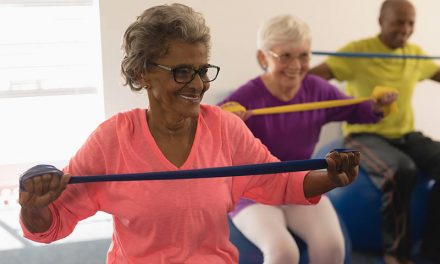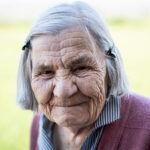Healthy nutrition for the over 60s
Even those who have eaten healthily all their lives will find their dietary needs change as they advance into their 60s and beyond. We may not feel like we are ‘slowing down’, but our bodies definitely are! Being less active, losing muscle mass and the ageing process itself all contribute to slowing down our metabolism.
Weight gain
Which means that if our diet doesn’t change, we’re going to start gaining weight. Being overweight puts additional pressure on hearts and lungs, leading to an increased risk of heart disease, diabetes, certain cancers and breathing difficulties. So it’s important to adapt our eating habits to avoid piling on the kilograms as we get older.
Physical activity is important throughout life, but is especially beneficial for older people. Exercise improves a sluggish metabolism and helps maintain muscle strength. Weight bearing exercise, such as walking, jogging or dancing, helps maintain bone density to reduce the risk of osteoporosis. If you suffer from painful joints or arthritis, swimming provides many of the same benefits without causing further damage to knees, hips and ankles.
Weight loss
Conversely, some people lose weight as they get older. This may be caused by poor appetite, muscle loss, depression, or problems with their teeth. Illnesses like cancer, Alzheimer’s and dementia can also cause weight loss; so too can the drugs used to treat them and other medical conditions.
Weight loss resulting from lack of food or vitamins is just as unhealthy as weight gain. Being undernourished can weaken your immune system, make it harder to absorb medication, hinder wound healing, reduce muscle density, and make bones more brittle – increasing the risk of falls and broken bones.
Healthy nutrition for the over 60s is not just about eating less. It’s about eating properly to ensure our ageing bones, hearts, skin and other organs get the right nutrients to keep us healthy.
Healthy Nutrition for the over 60s – What to eat
- Try to eat something from each of these five main food groups every day:
- Protein (Meat, fish, eggs, lentils, nuts)
- Starch (rice, cereal, pasta, bread, oats, potatoes, noodles)
- Vegetables
- Fruit
- Dairy (milk, cheese, yoghurt)
- Keep bowels active by including plenty of fibre in your diet. Wholegrain cereals, bread, fruit, dried fruit, dried peas, beans and lentils are all excellent sources. Drinking plenty of water also helps prevent constipation.
- Mind your teeth! Nuts, grains and hard fruits can be difficult to chew, especially if you have dentures. Cooked and canned fruits and nut butters provide the same nutrients without the risk. If you love biltong, try the powdered version, sprinkled onto salads, soups or sandwich fillings.
- If you’re not very hungry, eat the protein part of your meal first. Protein is the building block of the body and essential for repairing and maintaining healthy cells. If your appetite is poor, rather eat five to seven snacks a day than trying to munch your way through two to three big meals. Or try to eat with other people. Turning meals into a social occasion makes it easier to finish the food on your plate.
- The risk of dehydration increases with age, so be sure to drink plenty of water and other fluids. You may not feel thirsty – especially if you’re not exercising – but you still need 6-8 glasses of water, juice or tea every day. Many elderly folk deliberately cut down on liquid intake because they worry about making it to the loo in time. Weak bladders are also part of growing older! However the dangers of dehydration are much more serious. Common symptoms include tiredness, poor concentration, weakness, low blood pressure, dizziness and increased risk of falls. In severe cases, dehydration can cause fainting, heart failure, rapid breathing, a fast, weak pulse and ultimately, death.
What not to eat (or only in limited quantities)
- Foods high in saturated fat (biscuits, pies, processed meats, pizza, fried foods, chips and other savoury snacks)
- Butter, cream and full fat milk. Choose low fat milk, yoghurt and cheese, unsaturated margarine and cooking oil.
- Too much salt increases the risk of developing high blood pressure. As we age, we tend to lose sensitivity to salty and bitter tastes, and spice up our food with extra salt. Rather season and cook with herbs and spices. Also limit your intake of prepared foods that are high in salt, e.g. bacon, ham, salami, savoury snacks, and sauces.
- Sugar creates energy ‘spikes’, weight gain and tooth decay. Sugar occurs naturally in most fruits; what you need to avoid are products containing added sugar, such as sweetened soft drinks, cakes, chocolate, sweets and peanut butter with added sugar.
- Alcohol – limit your intake to avoid damage to your liver and brain, and reduce the risk of some cancers. Drinking alcohol also increases the chances of accidents and injury.
Poor food choices
Older people may also make poor food choices because they are:
- Bored, lonely or depressed. If you live alone and don’t have absorbing hobbies to keep you occupied, frequent visits to the fridge or cupboard in search of tasty snacks can become a habit. Fair enough if you’re snacking on mini tomatoes and carrot sticks. But who does that? You’re more likely to be reaching for the biscuits, chips, sweets or chocolates!
- Living on a tight budget. Healthy food options like meat and fresh fruits are expensive. So if you don’t have much to spend, you’re more likely to fill up on bread, rice, potatoes, noodles and pasta. Whilst these foods leave you feeling satisfied, the feeling wears off quickly leading to overeating.
- Incapable. If you find it difficult to get out to buy groceries or stand at the stove … or you don’t know how to cook (e.g. your partner used to do all the cooking before he/she died) you simply might not be able to plan and prepare nutritionally balanced meals. Those who live alone may also find ‘cooking for one’ boring. This is where a Tafta’s Meal Delivery Service makes all the difference. Properly balanced and freshly prepared meals are delivered to your door every other day, at a nominal rate. For more information, please email intake@tafta.org.za.
Topping up essential vitamins for healthy nutrition in later life
If you eat less or have digestive issues, you may be deficient in some important vitamins and minerals. Your doctor can perform tests and prescribe supplements if necessary. You can also top up essential vitamins through your diet.
- Calcium is essential for bone health and strong teeth, and you may need more of it as you get older to prevent loss of bone density and the risk of osteoporosis. Extra serves of low fat milk, yoghurt and cheese will help. For the over 70s, absorbing enough calcium from food may be inadequate and you may need to consider a supplement.
- Zinc helps your immune system and metabolism function. It’s also important to promote wound healing and may reduce inflammation. If you feel that you are not getting enough zinc, add a hard-boiled egg and a glass of milk to your daily diet.
- Vitamin E is believed to help lessen cognitive decline as we age. Eating just 30 grams of nuts a day will give you the vitamin E you need.
- Vitamin D is essential for keeping bones healthy. Known as the sunshine vitamin, Vitamin D is produced naturally by our bodies when our skin is exposed to sunlight. If elders don’t spend much time outside, they may not be producing enough. Top up on Vitamin D by including egg yolk, margarine, canned tuna or salmon and mushrooms in your diet.






 Look after your liver
Look after your liver Tee off at Tafta’s Golf Day Fundraiser
Tee off at Tafta’s Golf Day Fundraiser FullBright scholar arrives in June
FullBright scholar arrives in June Conversation Cards break communication barriers
Conversation Cards break communication barriers Secrets to longevity – what are they?
Secrets to longevity – what are they? Overcoming the ‘invisible woman’ syndrome
Overcoming the ‘invisible woman’ syndrome Saying it with flowers
Saying it with flowers Leap year – an extra ‘bonus’ day to show your love
Leap year – an extra ‘bonus’ day to show your love Save tax with Section 18A
Save tax with Section 18A Intergenerational communication is key
Intergenerational communication is key